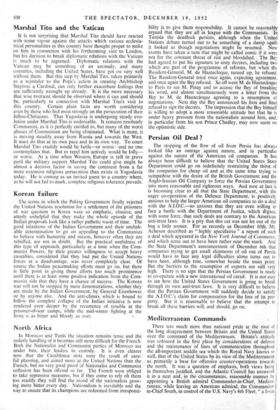North Africa
In Morocco and Tunis the situation remains tense and the orderly handling of it becomes still more difficult for the French. Both the Nationalist and Communist parties of Morocco are under ban, their leaders in custody. It is even clearer now that the Casablanca riots were the result of care- ful planning, and aimed more at the United Nations than the French, but no very good proof of Nationalist and Communist collusion has been offered so far. The French were obliged to take repressive measures, but if they come to rely oft them too readily they will find the mood of the nationalists grow- ing more bitter every day. Nationalism is inevitable and the way to ensure that its champions are redeemed from irresponsi- bility is to give them responsibility. It cannot be reasonably argued that they are all in league with the Communists. In Tunisia the deadlock persists, although when the United Nations debate turned out to be something of a damp squib it looked as though negotiations might be resumed. Now events have taken a turn that might be called comic if it were not for the constant threat of riot and bloodshed. - The Bey had agreed to put his signature to sixty decrees, including two which are part of the programme of reforms, but when the Resident-General, M. de Hautecloque, turned up, he refused. The Resident-General tried once again, expecting agreement, and once again the Bey refused. So off went M. de Hautecloque to Paris to see M. Pinay and to accuse the Bey of breaking his word, and almost simultaneously went a letter from the Bey- M. de Hautecloque agreeing to a resumption of negotiations. Next day the Bey announced his firm and final refusal to sign the decrees. The impression that the Bey himself is willing to adopt a more reasonable attitude but that he is under heavy pressure from the nationalists around him, and, in particular from his son Prince Chedley, may now seem on the optimistic side.


































 Previous page
Previous page